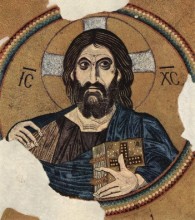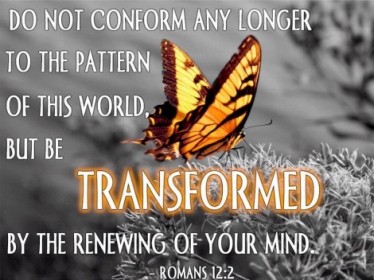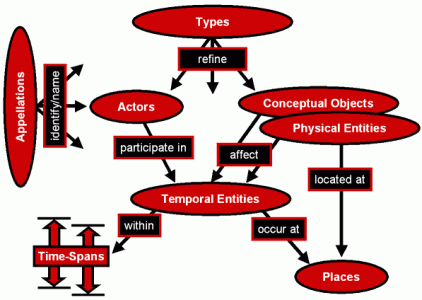Have you ever had a serious look at what you believe, and why? Too many people are laissez faire ("what will be will be"), uncritical "sponges", soaking up what is around them.
Having worked our way through the course so far it is clear that all of us have a combination of world views, some of which may be Christian/Biblical, but not all. We have seen that we pick up many of our beliefs and sense of meaning and significance from those around us: parents, friends, work colleagues; schools, universities, and those who seek to shape thinking more overtly in the public space (like the media, or politicians).
Such world views are often flawed because they stem from man's age-old rebellion against God. The "natural man" does not submit to Christ. As Christians we are challenged to have another look at what we believe, and why, and how this measures up to Christ.
We have considered the question of world view from a number of angles.
- First, broadly following the outline suggested by David A Noebel and others (but expanding on them) we compared and contrasted a number of dominant world views through the lenses of theology, philosophy, ethics, biology, psychology, law, politics, economics and history. Such comparisons are informative and interesting, but we need to go much further if we are to experience personal transformation.
- Next, building on an approach suggested by Bill Bright and Loren Cunningham (and overlapping a little with Noebel) we considered the Christian world view in the context of "cultural mountains" or spheres of influence in our society: theology, sociology & philosophy, law, ethics, media (print, radio/television, entertainment, social media), politics & government, power, public policy, international relations, education, marriage & the family, science, environment, economics, art & literature, and history.
- This approach is helpful; it helps us focus on areas in our society where thinking occurs and has the capacity to subvert our own thinking; but it becomes more complex when applied to multiple cultures.
- Then we looked at a Christian world view in terms of an interpretation of history, and as a system and foundation for personal belief in terms of the great questions of life. The concept of "What would Jesus do?" is relevant here, although the answers are not always clear, because Jesus lived in another era and cultural setting and because we sometimes lose objectivity answering such a question (if we have an agenda to keep a particular interpretation, relationship or lifestyle we will insert any answer that suits us).
These are all informative approaches, but if we limit our focus to them we will become siloed in our thinking. In the New Testament the Pharisees and Sadducees were siloed. Christian denominations (all brands) tend to be siloed. Cultures are siloed. The Kingdom of God should never be siloed.

We have seen that it is possible to have a technically correct and intellectually defensible position but not be challenged or changed, ie to subscribe to a Christian world view intellectually, comply externally with behavioural expectations set by others, or belong to a particular church stream but operate out of knowledge, tradition or to meet the demands of people who mater to us, not a living relationship with God, submission to Christ and the leading of the Holy Spirit, or an active desire to be "salt" and "light" in our world.
We cannot shield ourselves from secular world views, but we need to understand them and distinguish truth from error. We do not have to submit to secular thinking. It has been said (attributed to Martin Luther) that, "We cannot control birds flying over our heads, but we can stop them nesting in our hair". You cannot always prevent a negative thought from entering your mind, but you do have the ability to prevent that thought from taking root and ruling you. Provided you learn how to recognise it in the first place.
Scientists remind us that the most dangerous threats we face are not those can see (wild animals, people, heavy machinery out of control), but those that are often invisible to the naked eye, like viruses and other diseases. Likewise, it is not the most obvious errors that threaten us, but those that slip under our guard because we do not recognise them.
Here is the dilemma: if we are culturally conditioned how can we change?
We now turn to some of the key elements of personal transformation that will take our world view from a concept to a lifestyle.
Resolving the global search for identity
Everyone searches for identity:
"When I discover who I am, I'll be free." (Ralph Ellison, Invisible Man)
"Most people are other people. Their thoughts are someone else's opinions, their lives a mimicry, their passions a quotation." (Oscar Wilde)
"Everybody is identical in their secret unspoken belief that way deep down they are different from everyone else." (David Foster Wallace, Infinite Jest)
"I would rather be what God chose to make me than the most glorious creature that I could think of; for to have been thought about, born in God's thought, and then made by God, is the dearest, grandest and most precious thing in all thinking." (George MacDonald)
"You're just trying on different identities, like everyone in those Shakespeare plays. And the people we pretend at, they're already in us. That's why we pretend them in the first place." (Gayle Forman, Just One Day)
"I mean, we're all trying to find out who the hell we are, aren't we?" (Robert Ludlum, The Bourne Identity)
"Impaled on my wall
My eyes can dimly see,
The pattern of my life
And the puzzle that is me.
From the moment of my birth
To the instant of my death,
There are patterns I must follow
Just as I must breathe each breath.
Like a rat in a maze
The path before me lies,
And the pattern never alters
Until the rat dies."
(Simon and Garfunkel, Patterns)

Christianity gives us purpose and identity. We are men and women, created in the image of God, God loves us, we are separated from Him because of sin, but Christ died for us, to bring us back into relationship with God, as a world, and as individuals. Each of us is unique, with names, personalities, abilities, strengths and weaknesses, talent and limits, and God has a plan for each of our lives. There is no other religion in all the world that shows us this about our real identity. Only Christ makes us "complete". We are of infinite value to Him, not subject to some cosmic cost benefit analysis. Relationship with Him becomes the foundation for everything else.
This is not rugged individualism, it is more fundamental than that. Individualism creates false identities, the true search is how to fill the void. Without God we spend our lives searching for the missing link, self-esteem, hope and purpose.
Belief, and centrality of the Incarnation
The word "incarnation" is used to express the idea of Jesus Christ coming to earth in human form. The word is a Latin term that literally means "the act of being made flesh." This concept is used in John 1:14, which speaks of Jesus who "became flesh and dwelt among us." While He was God, Jesus had human nature.
One of the major dilemmas over history was how Creator God could even begin to understand what it meant to be human. How could He?
"Do you have eyes of flesh? Do you see as a mortal sees?" (Job 10:4)
The Son of God came in the flesh, in order to be the Saviour of mankind. Without the Incarnation, Christ could not really die (He would have been more powerful than death) and the cross would be meaningless. But the incarnation is much more. It means that God knows first-hand (experientially) what it is like to be human, to be tempted, misunderstood, unappreciated and alone, as a human, to feel weakness, hunger, tiredness, thirst, rejection, tears and physical pain, experience disappointment and face death. As a human being, Jesus needed shelter from the elements, the way Jesus saw the world was not limited to His divine nature. He processed what he heard and saw, not from the divine perspective, but in His incarnate capacity as a man.


It is not the voice of God from Mt Sinai that models discipleship, but the God-man Jesus Christ. Jesus was His name; Christ was His title. He helps us see, as human beings, the way God sees the world. He gives us the divine DNA, so that we can perceive things in the spiritual realm that our non-Christian friends and neighbours do not. "For we do not have a high priest who is unable to sympathize with our weaknesses, but one who in every respect has been tempted as we are, yet without sin." (Hebrews 4:15).
Revelation
Linked to incarnation (God becoming flesh) is revelation (God revealing Himself to our hearts on a one-to-one basis).
Remember how people gain and change their views?
- incubation and inculcation (eg parents)
- education (eg school)
- persuasion (eg peer pressure)
- compulsion (eg authority figures, such as government or employers)
- graduation (eg media)
- revelation (from God) - "their eyes were opened and they recognized him" (Luke 24:31)
- The last of these stands out: "revelation". Thinking "Christianly" does not come naturally. The Bible teaches that the natural man or woman is spiritually blind, unable to see. No amount of modelling, education, persuasion, compulsion or gradual understanding can penetrate that blindness. It requires revelation, from God.
"We also have the prophetic message as something completely reliable, and you will do well to pay attention to it, as to a light shining in a dark place, until the day dawns and the morning star rises in your hearts. Above all, you must understand that no prophecy of Scripture came about by the prophet's own interpretation of things. For prophecy never had its origin in the human will, but prophets, though human, spoke from God as they were carried along by the Holy Spirit" (2 Peter 1:19-21)
Knowledge and understanding alone are not transformative. The only thing that transforms are a supernatural experience and relationship.

Following revelation comes application.
"Why do you call me, 'Lord, Lord,' and do not do what I say?" (Luke 6:46)
Belief without practice is empty. Genuine Christianity means knowing that Jesus came and having a God-given revelation of who He is, followed by radical submission to His Lordship.
"I have been crucified with Christ. It is no longer I who live, but Christ who lives in me. And the life I now live in the flesh I live by faith in the Son of God, who loved me and gave himself for me." (Galatians 2:20)
"When Christ calls a man, he bids him come and die." (Deitrich Bonhoeffer)
What does a life "crucified with Christ" look like? Discuss.
Considering the following challenge:
"Don't you know that all of us who were baptized into Christ Jesus were baptized into his death? We were therefore buried with him through baptism into death in order that, just as Christ was raised from the dead through the glory of the Father, we too may live a new life. For if we have been united with him in a death like his, we will certainly also be united with him in a resurrection like his. For we know that our old self was crucified with him so that the body ruled by sin might be done away with, that we should no longer be slaves to sin - because anyone who has died has been set free from sin." (Romans 6:3-7)
As far as Jesus was concerned, pagans run after possessions, comforts, position, honour, lifestyle guarantees, but these are not what being a Christian is about. For Jesus, success was complying with the will of the Father, spending time with Him, doing His will, even at the cost of personal comfort.
So do not worry, saying, 'What shall we eat?' or 'What shall we drink?' or 'What shall we wear?' For the pagans run after all these things, and your heavenly Father knows that you need them. But seek first his kingdom and his righteousness, and all these things will be given to you as well. Therefore do not worry about tomorrow, for tomorrow will worry about itself. Each day has enough trouble of its own." (Matthew 6:25-34)
Transformation
As Christians we are called to "imitate Him".
Follow my example, as I follow the example of Christ "(1 Corinthians 11:1).
Thinking Biblically, thinking like Christ. That is the call and challenge to every Christian, and every Christian community. The role of the church in the world is not to seek to gain the political ascendancy, or assert our moral codes over other people, but to be transformed and reflect Christ.
1. What is "transformation"?
"Until Christ is formed in you" (Galatians 4:19) (morph)
Genuine transformation has been defined as "a complete or major change in someone's or something's appearance, form, etc." (http://www.merriam-webster.com/dictionary/transformation).

How is your transformation going? What steps are you (or your church) taking to assist your transformation into the likeness of Christ?
The Christian life involves transformation, but too few Christians take it seriously. Transformation might cut across our programs, it might require too much of us. However, without becoming like Christ on the inside we will never think with a genuine Christian world view; at best we will try to meet our church's expectations, or stereotypes about what the Christian life is all about.
The Christian world view is not about Christian culture; it is about Jesus Christ. We have received "life from above"; what we believe and the way we live reflects that life; it is never the other way around. Of course it involves obedience, because a Spirit-influenced heart-led choice (Colossians 3:2) that leads to obedience leads to habits that lead to character. But both the source and goal is Christ.
Transformation is more than just getting an idea, a flash of inspiration, or changing our habits; it is a changed way of thinking. What we are on the outside reflects what exists on the inside.
 (morph) is more than a lightbulb moment.
(morph) is more than a lightbulb moment.
In the Bible transformation means "change or renewal from a life that no longer conforms to the ways of the world to one that pleases God" (Romans 12:2). This is accomplished by the renewing of our minds, an inward spiritual transformation that manifests itself in outward actions. The Bible presents the transformed life in Christ as demonstrated through our "bearing fruit in every good work [and] growing in the knowledge of God" (Colossians 1:10).
Evidence of transformation within us is seen in the way we increasingly reflect the likeness and glory of Christ (2 Corinthians 3:18).
"You, however, are controlled not by the sinful nature but by the Spirit, if the Spirit of God lives in you. And if anyone does not have the Spirit of Christ, he does not belong to Christ" (Romans 8:9).
To be considered children of God, we must be led by the Spirit of God. And it is through the power of God's Spirit that Christ lives within us. The transformed life mirrors the attitude of the apostle Paul:
"I have been crucified with Christ and I no longer live, but Christ lives in me. The life I live in the body, I live by faith in the Son of God, who loved me and gave himself for me" (Galatians 2:20).
This power of transformation comes from one source. Paul said, "For the message of the cross [the gospel] is foolishness to those who are perishing, but to us who are being saved it is the power of God" (1 Corinthians 1:18). In speaking of Jesus, the apostle Peter declared that, "Salvation is found in no one else, for there is no other name under heaven given to men by which we must be saved" (Acts 4:12)
Transformed lives begin with the gospel message of Christ, for in it is the power of God. It is the gospel that brings us salvation:
"I am not ashamed of the gospel, because it is the power of God for the salvation of everyone who believes: first for the Jew, then for the Gentile. For in the gospel a righteousness from God is revealed, a righteousness that is by faith from first to last, just as it is written: 'The righteous will live by faith'" (Romans 1:16-17).
Through the gospel message of Christ and relationship with the Holy Spirit (our Teacher) we learn "to put off our old selves, which belongs to our former manner of life and is corrupt through deceitful desires, and to be renewed in the spirit of our minds, and to put on the new self, created after the likeness of God in true righteousness and holiness" (Ephesians 4:22-24).
2. Transformed Thinking
We have previously seen that sociologists believe that our world view can be informed or changed by the people we hang out with, especially if we want them to admire us. We find plausible the views of those whom we like and wish to like us in turn. We are both rational and social beings. We can be "set up" in our thinking by the people with whom we associate, whether at work, school, social clubs or community organisations ("Bad company corrupts good character", 1 Corinthians 15:33).
But we are not simply brains in vats, or robots who do not think for ourselves. We can think outside the box, change our minds, and recalibrate our thinking. Our thinking does not inevitably have to socially constructed, the product of our social location.
The world's views of transformation focus on self (as the focus and source) and individualised effort. "Our whole spiritual transformation brings us to the point where we realize that in our own being, we are enough." (Ram Dass, American philosopher). That view is common, but it runs counter to Christianity.
The Christian world view involves transformed thinking brought about by the work of Christ and the power of the Holy Spirit.
"... be transformed (to change into another form, to transform, to transfigure) by the renewing of your mind" (Romans 12:2)

Christianly transformed thinking is radical (lit "going back to the roots"). It is more than signing up to a creed, putting on a pair of Christian "glasses" made by a denominational brand. It is not a table of code, a cypher, a list of commands to be recited according to the circumstances, or a defined set of do-it-yourself instructions.
The opponents of Jesus' did not understand this, so they missed the point, preferring instead measurable externalities, such as compliance with regulations.
A Christian world view comes from "spirit and life" (John 6:63). Conformity is external. Transformation is internal, remaking us in Christ's image. We are complete in Him.
3. Evidences of transformed thinking
| Old World View | New Belief |
|---|
| Muslim | God is one, but He can be known; He is our Heavenly Father; He freely gives the assurance of eternal life, on the basis of Christ's work alone, not selective predestination or personal merit |
| Humanist | man cannot save himself; we need the God who is real and personal, who can give us hope in place of despair; God has made incredible knowledge and skills available to the human race, but the highest purpose is to know and worship Him, not our achievements |
| Hindu | there is one God, who loves us individually, who can forgive all of our sins; we have the assurance He is good enough to give us eternal life and hope when we die at the end of this single life |
| Buddhist | Jesus Christ is the Truth. God is the one we are searching for; we can enjoy the presence of God now and hope for a very real, full, meaningful eternity |
| Nominal Christian | Jesus alone is the cornerstone of our faith and life, not this or that tradition; repentance and faith give us access to the grace of God |
| Marxist | "Utopia" is not a classless world society where ills will be resolved, where each will give according to his ability and receive according to his need; our hope is eternal, not physical or political; the visible is temporary, trust in Christ alone can bring a new, eternal life |
| Neo Pagan | God is real, He is one, he wants to have a relationship with us through His Son Jesus Christ; fulfilment comes from His gift of eternal life; we are "complete" in Christ |
| Individualist | God loves us as we are, life is more than here, now and me; He has a plan for each of us as individuals and as part of His body, the church, the Christian community; we need and complement one another according to God's truth, gifts and purposes; when we feel alone, He is there, giving us abiding meaning that we can find nowhere else |
| Pluralist | there is one God, one way, through Christ, but the gifts and call of God are equally to all men and women; the world-wide community of God is made up of many different ethnes and cultures, but all find fulfilment in Christ. |
| Relativist | there is one God, and one way to God, through Christ, but we can have certainty as to the universality, truth and power of His revelation; Christian belief is centred on the unchangeable Gospel, valid for all people, in every generation |
| Nationalist | nations rise and fall, our citizenship is in heaven; our expectation is not that human governments will make life better for us, but that God will fulfil His will for human destiny; we have an eternal hope |
| Liberal | God is real; His revelation is trustworthy and has been given to us to lead to effective Christian living now and eternal life to follow; the Christian life is based on a faith that works; while popular opinion changes God never changes |
| Animist | there is one God; we need not fear unknown spiritual realms; the Holy Spirit lives in us and is greater than those that are in the world |
4. The Life of Moses as an Example of Transformed Thinking
"By faith Moses, when he had grown up, refused to be known as the son of Pharaoh's daughter. He chose to be mistreated along with the people of God rather than to enjoy the fleeting pleasures of sin. He regarded disgrace for the sake of Christ as of greater value than the treasures of Egypt, because he was looking ahead to his reward. By faith he left Egypt, not fearing the king's anger; he persevered because he saw him who is invisible. By faith he kept the Passover and the application of blood, so that the destroyer of the firstborn would not touch the firstborn of Israel. By faith the people passed through the Red Sea as on dry land; but when the Egyptians tried to do so, they were drowned." (Hebrews 11:24-29)
There were three phases in Moses' journey: (i) as the adopted son of Pharaoh's daughter; a life of privilege, power, comfort and ease; (ii) as a shepherd in the backside of the desert, where prophets of God were made; and (iii) as leader of the emerging nation of Israel under Jehovah. Moses spent approximately 40 years each in three very different cultural environments.
There is no way that Moses could have led Israel unless he had (first) a heart transformation, by faith, away from the pleasures of sin and the treasures of Egypt. His journey is given to us of the power of faith at work in a changed life.

Like Moses, our thinking (and our doubts) can be transformed by an enlarged view of God, and by seeing people and events from His perspective.
Consider also the change of view of the Psalmist Asaph, when He saw beyond the current realities of the wicked and understood their final end (Psalm 73), compared with the constancy of God's dealings in his own life. Or the servant of Elisha, when God opened his eyes and he saw that the armies of God were greater than the forces of the Arameans (2 Kings 6:8-22).
Transformed thinking involves looking at the world through grace-filled eyes, seeing people and circumstances in the way that Jesus did (see 2 Corinthians 5:16). Unbelievers often assume that Christians look at them through eyes of judgement, religion and our own morality and standards; that is the easiest thing in the world; Jesus came not to judge, but to save (John 3:17).
Developing a Christian World View
While revelation is the key, there are things we can do to develop a Christian world view.
- submit your life daily to Christ - a genuine Christian world view can only come from Him (Matthew 11:29)
- learn to listen to the Holy Spirit, ask Him to guide you and give you insight; get to know Him (John 16:13); He is the author of the Book
- spend more time in the Word of God (Ps 119:130)
- memorise passages from God's Word; He can use them in your thinking; bring them to your remembrance, use them to teach and lead you, and powerfully sort out your views and thought life (cf Hebrews 4:12)
- listen, really listen, to the teaching of God's word to which you are exposed in your church, home group, reading (2 Timothy 1:13; 4:1-3)
- as you get into God's Word, find out and learn what it says about the great issues of personal life (including singlehood, marriage and parenthood; sex and sexuality; work, career and leisure; money, ethics and possessions; managing interpersonal conflicts; hope, significance and dealing with difficulties; sickness, grief, personal recovery and facing death)
- remember that the wisdom /knowledge, isms of this world are not the wisdom or ways of God (1 Corinthians 3:9; James 3:15) and that everything needs to be dissected and questioned, even the culture in which you have grown up
- ask God to show you areas in your life and beliefs that need to change
- journal what the Holy Spirit is saying to you
- check out what you hear from other people (Acts 17:11); not every claim is true; there are people whose aim will be to try to subvert your values
- don't depend on your ideas, learning, experience; we can all delude ourselves from time to time
- remember that you are involved in a spiritual battle, that includes your thought life (2 Corinthians 10:5)
Revelation implies drawing back a curtain, giving new understanding, full disclosure, showing what has previously been hidden or incomprehensible to the individual. A change of mind is not revelation. Neither is "leaning on our own understanding" (Proverbs 3:5). Nor is it learning about something for the first time. Revelation means that the individual is given insight supernaturally, by God, who removes scales, takes away barriers to understanding. "I was blind but now I see!" (John 9:25).
Transformation and revelation are essential if we are to truly see the world through the vision, mind and eyes of Jesus Christ. Let the Holy Spirit speak to you. Be open to transformation in your own life, in line with the vision outlined in Paul's first letter to the church at Corinth:
"...we all, who with unveiled faces contemplate the Lord's glory, are being transformed into his image with ever-increasing glory, which comes from the Lord, who is the Spirit. (2 Corinthians 3:18)
We will continue this theme of transformation in developing a Christian World View in coming lessons.








 (morph) is more than a lightbulb moment.
(morph) is more than a lightbulb moment.


